Former chief justice offers a behind-the-scenes
look at his term
Former Chief Justice Ronald M. George’s memoir, “Chief:
The Quest for Justice in California,” was published last month by UC Berkeley’s
Institute of Governmental Studies. George is donating the proceeds from the
book to the university. Laura Ernde, the editor of the California Bar Journal,
sat down with George to ask him about his approach to the oral history project and
what lawyers can learn from it. What follows is an edited version of their
conversation, including excerpts and photos from the book.
Your successor, Chief Justice Tani Cantil-Sakauye,
wrote a nice introduction for your memoir. What was your reaction
when you read that?
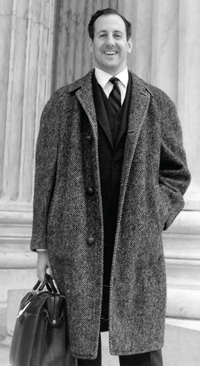 |
| Representing the State of California at the first of six oral arguments before the U.S.Supreme Court, 1969 |
I was very pleased for it. What it reinforced for me is the
fact that each chief justice at least in modern times built on the
accomplishments of his or her predecessors and in turn will contribute to the
continuity, but to new developments and improvements. There’s a wonderful
tradition in the California judiciary of persons who have worked to improve the
system, not just through the opinions that they author, not just through
improved procedures at the Supreme Court, but through a real concern with
improving the structure of the judicial branch so they can better serve the
people of California through various reforms and improvements in access to
justice.
Why did you choose to do it in this format, to record
an oral history rather than take pen to paper and write your own memoir?
In a sense it really wasn’t my choice, because I was
asked to do this before I even thought of retiring and I put it off. I really was
on a 24-7 schedule. Once I retired I had no excuse to say no, especially since
as chair of the board of the Supreme Court Historical Society, I had been asked
by the board to encourage other judges and justices to engage in oral history
interviews to preserve the record and history of the courts in California.
Laura McCreery, who is the oral history project director for the Institute for
Governmental Studies at UC Berkeley, although not a lawyer, is extremely
knowledgeable and diligent about obtaining the background required to conduct
meaningful oral history interviews. That’s the format that was commissioned by
the historical society, so of course I acceded to the existing format. Why
didn’t I chose to write my own book? I don’t know whether I would have had the
discipline to sit down and write a book from scratch. But this was an extremely
enjoyable and I think informative way of obtaining history of my tenure as
chief justice and the professional career that preceded my attaining that
position. I did have to prepare by going through files that I have, but I did
not maintain a diary of any sort. So it really was incredible to me how with
this Q&A format all sorts of memories almost in a Proustian fashion came
flooding back to me. Things I would not have thought I would recall going back
to my oral arguments as a deputy attorney general in the U.S. Supreme Court in
the late 1960s and early ’70s, through my career on the municipal, superior and
supreme courts. I think there are a lot of things in there that even people who
knew me well had not heard before. I found some of the experiences I had on the
municipal and superior courts to be quite entertaining, at least to me in
retrospect, and hopefully for the general reader as well.
What do you think the lawyers who read this can take
away from the things they learn and the stories you tell?
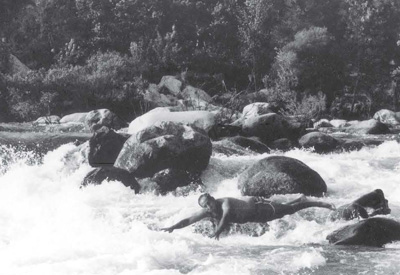 |
| A controversial dive into the Kaweah River, Three Rivers, California, 1980s |
I think they will attain my perspective on the real-life
experiences of a lawyer arguing appellate cases and my own experience as a
trial judge. Of course, most trial judges have colorful stories to tell about
things that have happened in court. But everyone has his or her own perspective
and unique experiences. Also, it’s of interest perhaps how one thing led to
another, just through advancements by way of the various opportunities that the
legal and judicial professions offer and how well the legal and judicial
professions have worked together to improve our mutual efforts. There’s also a
certain amount of inside baseball in terms of things that would be of interest
primarily to appellate practitioners reflecting the inner workings of the
California Supreme Court, the decision-making and case assignment processes and
other things as well. Those things in turn may be a bit esoteric to the general
reader who’s not trained or exposed to the law. There’s a mix of things of both
general and parochial interest to lawyers and judges.
What about young lawyers in particular. What do you
think it has to offer them?
I was asked in some of the questions about those
qualities that might help make one a successful lawyer and the interviewer
delved into the oral argument process and there were some helpful as
well as some humorous illustrations of when things go right and when they don’t go
right in oral argument. And there will be some practical tips. And as I said
before, how one has the opportunity as a young lawyer to advance in the legal
profession or by assuming a position on the bench, a lot of those things may
hold some interest to people who are in the legal profession.
You mentioned that even people who know you well might
be surprised at some of the stories. Is there one that you can think of that a
lot of people don’t know?
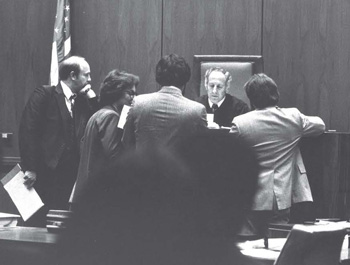 |
Attorneys in the Hillside Strangler trial (1981–1983) conferring at the bench
with Los Angeles Superior Court Judge George: Roger Boren, Katherine Mader,
Gerald Chaleff, and Michael Nash |
It’s hard to say. There’s so many things of that sort.
The experience at San Quentin [prison] the day before the
shootout [three guards and three inmates were killed in the 1971 riot]. Some
aspects of the lengthy Hillside Strangler trial [which he presided over as a
Los Angeles County Superior Court judge]. Some things that perhaps went into
the decision-making in the [same-sex] marriage cases that faced the California Supreme
Court. One of the things I enjoyed recounting in response to Laura McCreery’s
questions were some of my dealings with the Legislature and with the various
governors with whom I dealt and negotiated. I think some of those are stories
that weren’t necessarily of public record.
As you said, you covered a wide range of subjects,
from your childhood all the way through the marriage cases. What are the
subjects you think that deserve further exploration, maybe in a follow-up book?
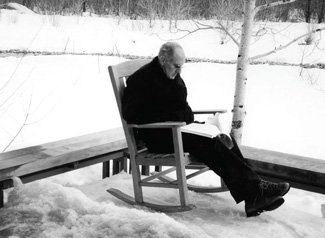 |
| Working on a Supreme Court opinion in Ketchum, Idaho, winter of 2002 |
Not by me. Been there, done that [laughs]. I don’t
believe I will have another book. I did describe the process as quite pleasurable.
I won’t say effortless, because I did not have the questions in advance. I was
told, I think appropriately, that if I were to be given the questions in
advance that would make the interchange less conversational and less
spontaneous. I did know the general areas and subject matters that were going
to be discussed. I did find myself going through files, photographs and things
to attempt to refresh my recollection over a 45-year professional career. In one
respect, maybe it was a bit more difficult than sitting down and writing a book
from scratch because although I was given the opportunity to edit the question-and-answer
interchanges, once we had moved on, let’s say beyond the municipal court to the
superior court, it was made clear to me there was no going back to other things
I might then want to discuss my years in the attorney general’s office. So to a
certain extent I had to cram for these sessions, feeling a bit like I was back
in my student days, knowing that that was basically my shot at getting off
whatever I wanted to respond to concerning the period. Whereas with a book, of
course, you can be in the last chapter and go back and rewrite the first
chapter. The 20 chapters in the book correspond directly to the 20 interview
sessions, which totaled 65 hours of tape-recorded conversations. So I’m not
planning on writing any more books. I’d rather read other people’s books than
write anything more myself.
What are you reading?
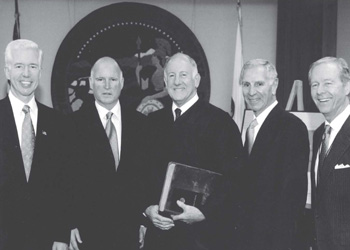 |
With former governors Gray Davis, Jerry Brown, George Deukmejian,
and Pete Wilson, at the induction of Governor Arnold Schwarzenegger, 2003 (Photo:
Governor’s Office) |
All sorts of different things, biography and history and
novels and so forth and engaging in travel and spending time with our sons who
reside in Southern California and two little granddaughters. And trying to
catch up on a lot of things I had to put aside with a certain amount of
sacrifice in terms of time spent away from family. Certainly my wife Barbara
was very indulgent, but I want to be able to enjoy everything that life has to
offer at this point instead of being totally consumed by my position. There
were basically three aspects to it. Writing one’s one-seventh share of the
opinions, which was my favorite part. Running the California Supreme Court,
which I thoroughly enjoyed. And that third part is being head of the judicial
branch and constantly being in Sacramento to deal with the fiscal crises of the
state and how they impacted the judicial branch and its funding. And that
latter part, although in many respects very satisfying given the nature of
reforms that were accomplished, was quite draining and never-ending. And every
time we managed to get through the severe crisis, whether it was through very
forceful advocacy on my part and that of others or just through a turn in the
state’s economic fortunes, there it was the next year back again like a new
tide coming in. That I’m very relieved to be free of, and I admire greatly my
successor for her perseverance and steadfast advocacy and commitment to the
interests of the judicial branch and to access to justice.